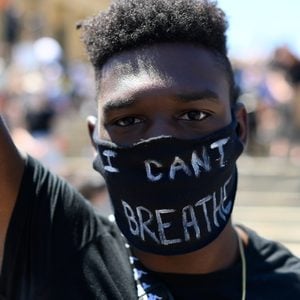The answer may be less important than the question itself.

Black or African American: Which Term You Should Be Using

Throughout history, Black people have been called many things. It began with Negro (“black” in Spanish and Portuguese), then colored, and eventually Black (and those are just the “polite” ones). Then in 1989, Jesse Jackson, the civil rights activist, promoted the term “African American” as a way to contextually dignify the origin of Black people in the Americas. But Jackson wasn’t the first to coin the phrase; the first known use of “African American” was found in a sermon published in Philadelphia in 1782 that was written “by an African American.” (The manuscript was discovered in 2016 by a law librarian at Yale University.) Given that there have been so many different terms used throughout the years, it’s not surprising that there’s so much confusion surrounding the issue.
Who is asking the question?
Before we get to Black vs. African American, let me say that I do not speak for all Black people; I speak for myself. I can say that my Black friends and I seldom deliberate on whether or not we wish to be called one or the other. Yet, the nuances of this question have impacted the way I converse with Black identifying individuals. This is usually a discourse on the country of origin or historical roots. For example, as a Somali-American, my background does not lend to sharing the experience of slavery in American history. That is a point I am often quick to make in my diversity work. Why? Well, because the roots of Blackness are deep and wide. They stretch all over the globe and I believe in honoring and acknowledging the reality of each one. And so, who is asking the question of Black vs. African American and what is the overall purpose behind it is an important consideration. If it is a White centrist phenomenon that is only trying to keep up with the appearances or tending to the “I am not racist rhetoric because I use the ‘right’ term,” then we are missing the point. It should be coming from a place of inquiry that aims to understand the systemic implications attached to each of these terms.
Even the government is struggling with the issue. The 2020 Census, which had previously included the category “Black or African American” in 2000 and 2010, now asks responders of all races not only to check off a box but also to write in their origins, for example, Jamaican, Haitian, Nigerian, etc. I proudly wrote in Somali after checking off the Black/African American category. This demonstrates the historical complexities of identifying Black people in this country. It begs the question, what is African American? The historical context of the civil rights movement in the United States and the increase of the African diaspora have now made the term a source of contention. These 15 essential books about understanding race in America help give the full perspective.
Showing up Black
While there is confusion and misunderstanding about the phrase “African American,” there is nothing subtle about Blackness. The transparency that comes with occupying Black skin is the very thing that makes us vulnerable. Yet, in my personal experience, I have met countless White people who do not feel comfortable addressing my skin color even in the most obvious situations. Something as simple as describing my physical appearance can turn into an uncomfortable interaction. (One example, when my 10 a.m. meeting shows up to the office and a colleague describes every one of my physical attributes besides the color of my skin to this individual, it is not helpful. Especially, if I happen to be the only Black person there. I am not just a skinny woman with curly hair. I am a Black woman with curly hair.) My Blackness does not need to be left out because a White person is afraid to see color. Leaving out the color of my skin is what perpetuates senseless crimes against Black people and is a dangerous oversight. It is important to see my Blackness because it will reveal the truth about how we weaponize Black bodies while ignoring their human value. When a Black person leaves their home, they carry their Blackness with them. This writer agrees that you should stop saying “I don’t see color.”
Granted there is a lot of beauty that comes with that Blackness, including a variety of rich and complex history. We also carry our customs and heritage; we carry the words of our ancestors and grandparents that detail our roots, and we carry accomplishments as nuanced as they come. Those ancestors and grandparents come from all different corners of the world and the specificity of this garners introspection and pride. To quote “Still I Rise,” Maya Angelou’s timeless poem, “Bringing the gifts that my ancestors gave, I am the dream and the hope of the slave.”
Beyond the semantics, we can meet
The most appropriate term to use is Black. Not because it is the correct term but because it speaks to the collective experience of people with darker skin without negating the individual or historical background. Not everyone identifies with the term African American, as Blacks can be from all over the world, not to mention that Africa is a continent, not a country. It is an ever-changing and evolving term mainly due to the migration of the various African diaspora over time. For me, I identify as Somali-American. I was born in Somalia and that is the language and heritage I carry. Still, I show up as Black everywhere I go. There is this subtle distinction embedded in the transparency of this reality.
Even more important, however, is that we allow Black people to use whatever term they feel best describes them. Perhaps the better question should be, how do we as a society allow for Black people to stand in their truth, whatever that may look like? Rather than policing language in a way that categorizes and groups people together, we must strive to break down any language that limits someone from owning their identity. Historically, this civility was not extended to enslaved people and so we must be willing to address the roots of these terms before we push Black people to check off a box to appease a general non-Black consensus.
Next, read on to find out what BIPOC stands for.
For more on this important issue, see our guide to the Fight Against Racism.
Editor’s note: The opinions here belong to the author. To submit your own idea for an essay, email [email protected].























